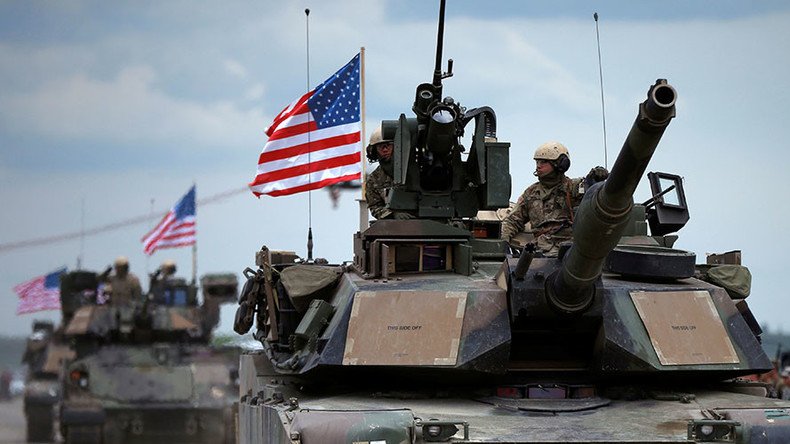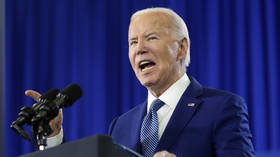Battle of the military budget: Congress, White House clash over NDAA

The GOP majority in Congress is pushing a draft of the 2017 National Defense Authorization Act, which they say will fully fund the US military. The Pentagon is not happy with micro-management, however, and the White House is threatening to veto the bill.
Speaker of the House Paul Ryan (R-Wisconsin) said the NDAA gives the troops a much-needed raise, authorizes “the necessary force, structure, equipment, and funding to close the readiness gap,” reforms the acquisitions process, and updates military laws to better fight sexual assault.
Ryan also pointed out that the bill blocks the transfer of any suspected terrorists from the Guantanamo Bay detention camp in Cuba.
“We will not jeopardize our national security over a campaign promise,” Ryan said, quoting his own February statement on Guantanamo. “It’s time for the president to finally move on from this issue,” he added.
The #NDAA helps close the military's readiness gap to make sure our troops have the tools they need.https://t.co/6IZWG0bxhn#NDAA
— Paul Ryan (@SpeakerRyan) May 18, 2016
The bill, known as House Resolution 4909, provides $517.1 billion in discretionary spending for the Pentagon – a $3 billion increase from the 2016 levels, but $587 million below President Barack Obama’s budget request. It was approved by the House Appropriations Committee on Tuesday, and sent to the House floor for debate on Wednesday.
“In an increasingly dangerous and rapidly changing world, we must guarantee that our military and intelligence community have the capability to defeat barbaric Islamic terror groups and deter aggressor-nations, like Russia, Iran, China, and North Korea,” said Defense Subcommittee Chairman Rodney Frelinghuysen (R-New Jersey). “This bill recognizes the critical need for increased funding for more training, readiness and equipment and provides for military families. And our heightened oversight ensures that every dollar counts.”
Among the bill’s provisions highlighted by the House Republicans, are $34 million for science programs at historically black colleges and universities, and $600 million in funding for Israeli missile defense research that is shared with the US. The bill also requires the Pentagon to improve suicide prevention efforts, provide better mental health care to service members, and report on the procurement of equipment specifically intended for female soldiers.
MT-@TaraCopp NDAA on House Floor today.DOD: Carter could recommend veto of 17 defense bill https://t.co/cTRnEJTurTpic.twitter.com/YKMje5L02k
— ISW (@TheStudyofWar) May 17, 2016
Defense Secretary Ash Carter was not pleased by what he called lawmakers’ second-guessing of his department. He criticized Congress for interfering in the Pentagon’s acquisition reforms – including abolishing the office he once held – as well as other matters.
“I would respectfully suggest that the informed expert judgment of the civilian and military leadership at the Department of Defense, which is embodied in our budget proposal, should receive greater support and be subject to less micromanagement,” he told reporters at the Sea Air Space expo in National Harbor, Maryland on Tuesday.
For his part, President Obama has threatened to veto the bill – just like he did last year – citing the House’s run around a budget compromise that shifts money from the warfighting slush fund into the base Pentagon budget. The White House also criticized the bill’s prohibitions on closing down Guantanamo Bay, and accused its authors of creating a “hollow force structure” by boosting Army troop levels “without the money to sustain it.”
This refers specifically to the NDAA’s funding of 27,000 more active-duty troops, 25,000 additional reservists, 11 more F-35 aircraft for all branches of the military, and an additional $2 billion for the Navy’s ship-building needs, Defense News reported.
“If the president were presented with H.R. 4909, his senior advisors would recommend he veto the bill,” says a memo sent from the White House’s Office of Management and Budget on Monday.
Ron Paul on NDAA 2017: Military Industrial Complex Wins, People Lose https://t.co/X5Gew1cY9xpic.twitter.com/Fm4CA9mvdB
— Ian56 (@Ian56789) May 17, 2016
Former Texas congressman Ron Paul agreed with the sentiment, but for different reasons.
The NDAA is a “terrible piece of legislation that does great harm to the United States under the guise of protecting” the US, Paul wrote on Monday. “It represents most of what is wrong with Washington. It is welfare for the well-connected defense contractors and warfare on our economy and on the rest of the world. This reckless spending does nothing to defend the United States. It is hastening our total economic collapse.”












